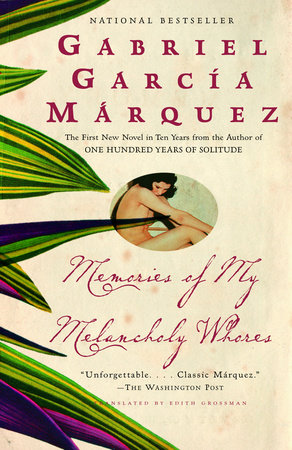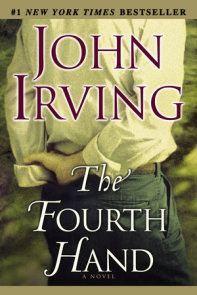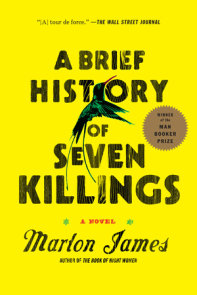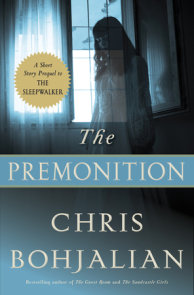READERS GUIDE
“García Márquez has composed, with his usual sensual gravity and Olympian humor, a love letter to the dying light.” –John Updike, The New YorkerThe introduction, discussion questions, suggestions for further reading, and author biography that follow are designed to enhance your group’s discussion of Memories of My Melancholy Whores, the first work of fiction in ten years from Nobel Laureate Gabriel García Márquez.
Introduction
On the eve of his ninetieth birthday, the unnamed narrator of Memories of My Melancholy Whores is seized by an inspiration: to give himself the gift of a night of wild love with an adolescent virgin. An undistinguished journalist and author of a weekly column for a provincial newspaper, he describes himself as “ugly, shy, and anachronistic” [p. 4]. All his life, beginning at the tender age of eleven, he has gone to bed only with prostitutes, and many of them, so many in fact that he has twice been awarded the dubious honor of client of the year by the town brothels. But age has diminished his desire, if not his amorous powers. For twenty years he has stayed away from Rosa Cabarcas’s brothel, but on the momentous occasion of turning ninety, he phones her to say: “Today’s the day” [p. 4]. And though she finds for him a fourteen-year-old virgin–so frightened she must be given a heavy dose of valerian to relax–his night with her turns out far differently than he anticipated. Instead of wild love he discovers “the improbable pleasure of contemplating the body of a sleeping woman without the urgencies of desire or the obstacles of modesty” [p. 29]. Looking back on this moment, he finds in it “the beginning of a new life at an age when most mortals have already died” [p. 5]. From the girl whose sleeping presence exerts a powerful hold on him, he learns the many ways he has deceived himself about his true nature, his real motives, and the no-longer-deniable consequences of a life lived without love. He “opens his heart to change,” buries himself in romantic writings he had long ago repudiated, and turns his columns into thinly veiled love letters to the girl he calls “Delgadina.” He finds, at last, after ninety years, “real life.”Displaying all the alchemical powers that have made Gabriel García Márquez one of the world’s most admired and acclaimed novelists, Memories of My Melancholy Whores is a tour de force, one of the most unusual and mesmerizing accounts of love in Western literature.
Questions and Topics for Discussion
1. The unnamed narrator of Memories of My Melancholy Whores says that he has “resolved to tell of my own free will just what I’m like, if only to ease my conscience” [p. 5]. Why does he have a troubled conscience? Why would the act of telling his story ease it? Does he succeed in this goal?
2. The narrator wants to give himself a “night of wild love with an adolescent virgin” [p. 5] to celebrate his ninetieth birthday. What is it, both physically and spiritually, that he gets instead?
3. What is the significance of the narrator falling in love with Delgadina while she sleeps? Why is he so taken by the “improbable pleasure of contemplating the body of a sleeping woman without the urgencies of desire or the obstacles of modesty” [p. 29]?
4. The narrator says that thanks to Delgadina, he “confronted [his] inner self for the first time as [his] ninetieth year went by” [p. 65]. What does he discover about himself? How has his experience with Delgadina led him to this knowledge?
5. When Rosa Cabarcas is about to tell him the young girl’s name, the narrator cuts her off: “Don’t tell me . . . for me she’s Delgadina” [p. 68]. Why doesn’t he want to know her real name?
6. The narrator says that he has never gone to bed with a woman he didn’t pay and that by the time he was fifty he had been with over 500 women. Why does he choose to have sex only with prostitutes? How might his own first sexual experience–being “initiated by force into the arts of love” [p. 109] by a prostitute when he was not yet twelve–be related to this choice?
7. A North American novelist celebrating love between a ninety-year-old man and a fourteen-year-old girl would very likely be condemned for endorsing child sexual abuse. What cultural or literary factors allow García Márquez to write such a story without provoking a firestorm of criticism?
8. In what ways is Memories of My Melancholy Whores like a fable or fairy tale? How does it combine the elements of magic and realism that are trademarks of García Márquez’s style?
9. What is the meaning of the sentence the narrator finds written in lipstick on the mirror: “The tiger does not eat far away” [p. 56]? Who left this message?
10. The narrator at times doubts the reality of Delgadina. “It troubles me,” he remarks, “that she was real enough to have birthdays” [p. 71]. Is his love for her simply a projection onto the blank screen of her sleeping body, or is he in fact responding to her on some primal, transformative level?
11. At the very end of the novel, the narrator says, “It was, at last, real life” [p. 115]. Why does he feel he is finally experiencing real life? In what ways has his life up to this point been unreal?
12. Love is a central theme in Gabriel García Márquez’s fiction. If you have read any of his other work, in what ways is the experience of love treated differently in Memories of My Melancholy Whores than in his earlier writing? In what ways are such works as One Hundred Years of Solitude, Innocent Erendira, Love in the Time of Cholera, and Of Love and Other Demons similar to Memories of My Melancholy Whores in their treatment of love, sex, and sexual exploitation?




















